2024-25 Board Fellows Experiences in the Field
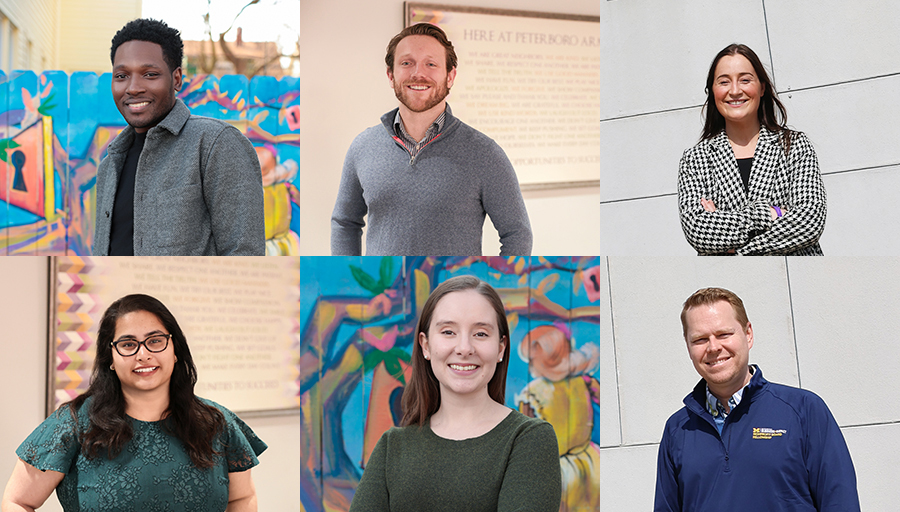
Overview
During the 2024-25 academic year, participants in Business+Impact’s 25th annual Board Fellowship program have served as non-voting members of local nonprofit boards while completing small strategic projects.
This year’s cohort features students from Michigan Ross, the Ford School of Public Policy, the Medical School, the School of Architecture & Urban Planning, the School of Education, the School of Social Work, the School for Environment and Sustainability, and the School for Public Health.
You can see the complete list of 2024-25 Board Fellows, but we interviewed a few of our Board Fellows here and learned a bit more about their personal experiences with the program:
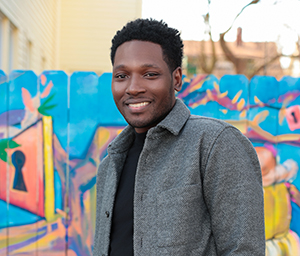
David Denton, MBA
Organization: Brilliant Detroit
Location: Detroit, MI
Describe the project you have worked on with the organization, and how did it further the organization’s mission? A core part of Brilliant Cities’ mission is scaling their model to reach more underserved communities, ensuring that families benefit from the support and programming that drive early childhood success. My project focused on developing marketing materials for two replication approaches that will allow Brilliant Cities to expand its impact even further. To help make this expansion effective and sustainable, we conducted interviews with industry leaders to gather insights on best practices for nonprofit growth, developed a readiness assessment to help potential partners evaluate their fit, and created a process map to provide a clear, actionable framework that makes it easier for communities to adopt Brilliant Cities’ proven approach.
What is the biggest thing you’ve learned from the Board Fellowship experience; what skill have you developed?
The biggest lesson I’ve learned is the importance of strategic decision-making in nonprofit growth. Expanding an organization’s impact isn’t just about reaching more people, it’s about ensuring that mission’s fidelity and adaptability go hand in hand. My work on replication models gave me firsthand insight into how nonprofits must balance maintaining their core values while adapting to the needs of new communities. One key skill I developed further was stakeholder engagement. Whether it was conducting interviews, gathering insights from the team, or refining materials, I learned how to better navigate different perspectives, communicate effectively, and synthesize information to support a shared vision. This experience strengthened my ability to bridge strategy with on-the-ground implementation.
What have you learned from attending your nonprofit board meetings? I’ve gained a deep appreciation for the collaborative and dynamic nature of board leadership. Seeing board members bring their expertise to the table by brainstorming ideas, offering constructive feedback, and shaping strategy showed me how strong governance can drive real organizational impact. One of the most valuable takeaways was witnessing how thoughtful discussion translates into action. It was powerful to see how feedback evolved into concrete initiatives that directly supported the organization’s growth and mission. These meetings weren’t just about ideas, but they were about making real, measurable change happen. Plus, the board members truly embodied the mission, demonstrating their commitment not just through words, but through their actions, decisions, and dedication to advancing the Brilliant Cities goals.
What impact will this experience have on your future plans? This experience has reinforced my passion for helping nonprofits scale their operations and communicate their value effectively. Whether through strategic consulting, board service, or leadership roles, I want to continue supporting mission-driven organizations in growing sustainably while staying true to their purpose. Through this process, I also realized how much I am interested in marketing, particularly in how storytelling, branding, and strategic messaging can amplify an organization’s impact and engagement. Beyond that, this experience has deepened my commitment to community impact. No matter where my career takes me, I know I want to stay connected to organizations that create meaningful change.
Do you have advice for future Board Fellows? Be proactive and fully engage with your organization. Your perspective and experiences bring value to the table, so don’t hesitate to ask questions, share your insights, and contribute to discussions. The more involved you are, the more you’ll gain from the experience. Also, take advantage of the opportunity to learn from board members and leadership. Their expertise in governance, fundraising, and strategic decision-making can offer insights that extend far beyond the fellowship. Treat this as a two-way exchange that while you’re there to support the organization, you’ll also gain invaluable knowledge, skills, and connections that will shape your professional and personal growth. Most importantly, enjoy the process. Being part of an organization’s growth and impact is incredibly rewarding, and this is a chance to both contribute and learn in meaningful ways.
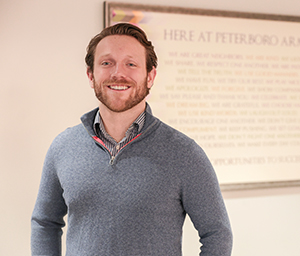
Nate Fisher, MBA/MUP
Organization: COTS
Location: Detroit, MI
Describe the project you have worked on with the organization, and how did it further the organization’s mission? COTS exists to create and facilitate opportunities that empower families in poverty to collaborate, thrive, and succeed in building strong households, neighborhoods, and communities. In recent years, COTS has experienced costs increasing faster than revenues, leaving a gap in the budget for future years. Our project seeks to identify and evaluate profitable business ventures that COTS can create and operate to contribute additional revenue to COTS to help increase its long-term financial sustainability.
What is the biggest thing you’ve learned from the Board Fellowship experience; what skill have you developed? One key lesson is the power of passion when it comes to board service. At the end of the day, the mission is what motivates all the board members to go above & beyond their day jobs to drive special projects and provide oversight. The work is hard, so having a passion for the mission is critical motivation. I have developed skills in managing multiple stakeholders, as our project requires us to collaborate closely with both COTS staff and leadership as well as a board subcommittee.
What have you learned from attending your nonprofit’s board meetings? I am impressed by how quickly a board meeting can move. I have learned the power of committees and committee reports. With good governance and clear roles, meetings do not need to be bogged down with aimless discussion.
What impact will this experience have on your future plans? This experience solidified my desire to serve on nonprofit boards in the future and also better educated me on how to approach the work with humility and equity. Importantly, the experience also reinforced how much of a commitment board service is, so I will need to ensure I have the appropriate bandwidth to take on a role down the road.
Do you have advice for future board fellows? You may end up learning the most from unscheduled conversations and interactions at board meetings or site visits. Try to make yourself available to attend things you are invited to — this opportunity won’t last long!
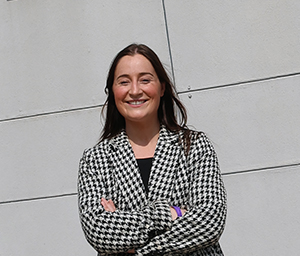 Colleen Heaney, MBA
Colleen Heaney, MBA
Organization: NEW (Nonprofit Enterprise at Work)
Location: Ann Arbor, MI
Describe the project you have worked on with the organization, and how did it further the organization’s mission? My co-board fellow and I have been working to implement sociocracy and sociocratic practices at NEW. We’ve worked on this project through a variety of deliverables: updated bylaws, improved position descriptions, and new member orientation materials to name a few. NEW has implemented Sociocracy throughout their entire organization to align with their core purpose of working with mission-oriented people and organizations, and communities. These changes can be seen in elements like circle structure (formerly known as boards or committees,) consent-based decision making, and feedback loops.
What is the biggest thing you’ve learned from the Board Fellowship experience; what skill have you developed? I’ve refined my public speaking and presentation skills. I’ve worked on some deliverables asynchronously, but also have worked with Pete, Yodit, and Matt, while also looping in our Circle (board) and governance sub circles on others. All of these interactions and touch points have helped me work on my public speaking and presentation skills in a productive manner.
What have you learned from attending your nonprofit’s board meetings? Pete and I attend our board meetings and also one of our sub circle committee meetings, the governance circle. We’ve learned the importance of a succinct and clear agenda so folks can prepare beforehand, as well as the importance of a diverse set of individuals on the board to bring in different insights and perspectives into the conversations. Most importantly, we’ve learned about how much work it takes to run these nonprofits and contribute to the important work NEW does. NEW operates with the sociocratic method so every individuals voice matters.
What impact will this experience have on your future plans? Being a nonprofit board fellow has solidified my interest in joining a board post-graduation. I’ve learned so much from the work we’ve done but just being able to experience the conversations and ways of working has helped me understand everything that goes into powering these nonprofits – most importantly, dedicated and hard-working individuals.
Do you have advice for future board fellows? Be a vocal part of meetings with your team. Your voice matters! If working with another fellow, be aligned from day 1. I’m so grateful to be working with Pete Woodman, a WMBA. We are in lockstep when working on our deliverables and I’ve learned so much from him. I would also say try and get to know board members of your nonprofit – for example we have been able to meet Will and Abigael outside of just our meetings through NEW’s relationship with Ross and it’s been a highlight of our experience.
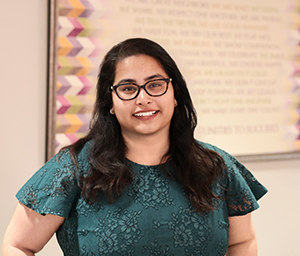 Yashvi Patel, MBA
Yashvi Patel, MBA
Organization: COTS
Location: Detroit, MI
Describe the project you have worked on with the organization, and how did it further the organization’s mission? Over the past several months, I’ve worked with COTS on a social enterprise project aimed at developing an independent revenue stream to support the organization’s mission. Our team facilitated a design thinking session with COTS leadership and key stakeholders to explore viable business models that align with their mission of breaking the cycle of poverty and homelessness. By helping identify sustainable funding opportunities, the aim of our project is to contribute to COTS’ long-term financial resilience, allowing them to expand their impact without relying solely on grants and donations.
What is the biggest thing you’ve learned from the Board Fellowship experience; what skill have you developed? One of the biggest takeaways from the Board Fellowship experience has been understanding the intersection of strategy and nonprofit governance. I’ve developed my ability to navigate conversations between mission-driven leadership and financial sustainability, learning how to balance big-picture vision with operational feasibility.
What have you learned from attending your nonprofit’s board meetings? Attending COTS board meetings gave me insight into the complexities of nonprofit decision-making. I saw firsthand how board members balance financial constraints, organizational priorities, and mission alignment. It also reinforced the importance of clear governance structures and proactive strategic planning. Beyond that, it has truly been an honor to attend the COTS meetings. It’s very obvious just how much the board cares about the work, the community and the mission. It’s been deeply inspirational to see the commitment, and the passion of the board.
What impact will this experience have on your future plans? This experience has deepened my commitment to social impact work and strengthened my ability to lead mission-driven initiatives. Whether in a professional or volunteer capacity, I see myself continuing to support nonprofits in strategic and operational capacities.
Do you have advice for future board fellows? For future board fellows, I’d emphasize the importance of listening and relationship-building. Understanding the organization’s culture, leadership dynamics, and long-term vision is key to making a meaningful contribution. It’s also helpful to be proactive—nonprofits often operate with limited capacity, so stepping up to take initiative can add significant value.
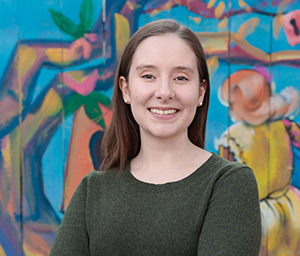
Jess Scarano, MPH/MSW
Organization: Brilliant Detroit
Location: Detroit, MI
Describe the project you have worked on with the organization, and how did it further the organization’s mission? This year, I have been working on a strategic benchmarking project With Brilliant Detroit/Brilliant Cities. In September, Brilliant Detroit announced that it would be launching an umbrella organization called Brilliant Cities. For my project, I conducted internal and external research on best practices and structures for other nationally-operating organizations with similar missions. I spoke with staff at Gilda’s Club, Dollars for Scholars, and Michigan American Civil Liberties Union. During the fellowship window, I also had the opportunity to lead and sit-in on informational interviews with field experts that were hand-selected by GLG. In the final stages of my project, I am working on synthesizing my qualitative data and looking more closely at organizational charts, finances, and reporting structure. This is an important step in supporting Brilliant Cities with ironing out their replication approach and examining other long-term strategies.
What is the biggest thing you’ve learned from the Board Fellowship experience; what skill have you developed? It was a privilege to join the Brilliant Cities’ board at such an exciting time in the organization’s history. This project pushed me into my stretch zone in so many positive ways. In order to effectively identify metrics and widen my scope, I had to assume a bird’s eye view to find the information I was looking for. Breaking the project down into smaller, actionable steps was a helpful strategy for managing my time and productivity. I have used similar methods for staying on top of my graduate coursework and extracurricular activities. I have also become more comfortable leading meetings and networking.
What have you learned from attending your nonprofit’s board meetings? Joining Brilliant Detroit/Brilliant Cities board meetings was my first exposure to these behind-the-scenes operations. I quickly learned that establishing individual relationships with board members is key to fostering a welcoming environment. Not only are relationships between board members encouraged, but building rapport with local stakeholders and communities is an essential part of collaboration as well. I admire the fact that community voice is at the forefront of Brilliant Cities’ mission and vision. I also observed board members having conversations about the workplace culture. Everyone seemed committed to hearing each other’s thoughts and offering different skills and perspectives to partner effectively.
What impact will this experience have on your future plans? Participating in the Nonprofit Board Fellows Program has been one of the shining highlights of my first year of graduate school. During one-on-one meetings with my mentors, I explored my professional strengths and values. Integrating principles of equity and compassion into my work is of utmost importance to me, and something I plan to continue doing through making connections and amplifying community voices. In the future, I see myself pursuing a career at a non-profit organization because it is a space where I can work collaboratively to generate innovative solutions for some of life’s most challenging problems.
Do you have advice for future board fellows? Take advantage of opportunities offered through the Nonprofit Board Fellows Program and your local organization! Some of the most enriching experiences I had were on-site working with the staff and families at various Brilliant Detroit locations. At Brilliant Detroit, many staff members are hired from within the neighborhoods and have a powerful “why” behind their job. Not only did this add insight to my project, but it motivated me in other meaningful ways as well. Additionally, attending fellowship workshops and social events allowed me to meet other University of Michigan students in different programs.
Do you have anything to add? I want to extend a heartfelt thank you to the Brilliant Cities staff, especially Cindy Eggleton, Aaron Appel, Chambraia Jones, and Caitlin Bush, and my co-fellow, David Denton, for an amazing experience.
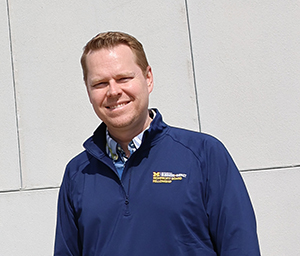 Peter Woodman, MBA
Peter Woodman, MBA
Organization: NEW (Nonprofit Enterprise at Work)
Location: Ann Arbor, MI
Describe the project you have worked on with the organization, and how did it further the organization’s mission? During my fellowship with NEW (Nonprofit Enterprise at Work), I worked with a partner on implementing a sociocratic leadership structure aimed at enhancing organizational decision-making and collaboration. This is a multi-year effort to transform NEW’s leadership model, which requires working closely with the Governance Circle, the Mission Circle, and the CEO. Sociocracy fosters equitable participation, distributed leadership, and transparency. These ideals align directly with NEW’s mission to empower nonprofits through improved governance and operational excellence.
Specific tasks included updating onboarding materials for board members and employees, revisions to NEW’s bylaws, and a FAQ about sociocracy in the context of NEW. By contributing to NEW’s adoption of sociocracy, we streamlined decision-making processes, increased employee engagement, and fostered a culture of inclusion, helping NEW to serve its mission more effectively.
What is the biggest thing you’ve learned from the Board Fellowship experience; what skill have you developed? The most significant lesson from my Board Fellowship was the importance of structured collaborative decision-making. I developed a deeper appreciation for how leadership frameworks like sociocracy can profoundly transform organizational culture. Specifically, I enhanced my facilitation and consensus-building skills, learning how to navigate complex discussions and achieve buy-in from diverse stakeholders effectively. The more impactful a non-profit organization becomes, the more stakeholders there are to support; this project gave me a great view into the complexities of managing that impact over the long-term.
What have you learned from attending your nonprofit’s board meetings? Attending board meetings at NEW taught me the critical role governance plays in driving nonprofit success. I observed how strategic decisions are carefully deliberated, considering both immediate needs and long-term sustainability. Witnessing experienced board members balance advocacy, accountability, and strategic oversight provided invaluable insights into effective nonprofit governance. I was also able to see additional board members join the organization, hear their perspectives, and better understand what it’s like to enter a non-profit board as a newcomer.
What impact will this experience have on your future plans? This experience reinforced my passion for mission-driven leadership and provided clarity about the type of organizational culture I want to foster in my future roles. Understanding sociocratic principles and nonprofit governance will guide my approach to leadership, emphasizing inclusive decision-making and continuous improvement. Professionally, I plan to leverage these skills to strengthen team dynamics and drive organizational effectiveness, whether in the non-profit or corporate sectors. Personally, as someone who plans to stay in the Southeastern Michigan community, better understanding NEW and their impact gives me a much better perspective on the resources available to Non-Profit organizations looking to make the greater Ann Arbor / Detroit region a better place to live and work.
Do you have advice for future board fellows? My advice for future board fellows is to embrace active listening and curiosity. Engage deeply with the organization’s mission, ask thoughtful questions, and genuinely seek to understand the challenges they face. This proactive approach will not only enrich your learning but also allow you to make a meaningful, lasting contribution during your fellowship.
How has this experience influenced your perspective on nonprofit effectiveness? This fellowship significantly expanded my understanding of nonprofit effectiveness beyond financial sustainability. I learned that fostering a healthy organizational culture, clear governance practices, and transparent communication are equally critical to achieving meaningful impact. Recognizing the holistic nature of nonprofit effectiveness has shifted my perspective to value the interconnectedness of strategy, culture, and governance in driving sustainable change. In some ways it aligns with my experience of the Ross MAP (Multi-disciplinary Action Project) – there are some universal challenges that all organizations face, whether they’re a non-profit, a startup, or a publicly traded company. Seeing some of those challenges first-hand helped me better understand the common problems leaders face, and the universal strengths that apply across any domain.

